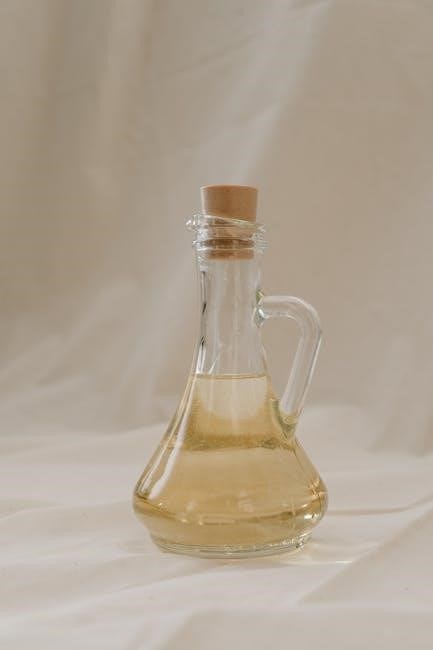
john deere oil filter guide
John Deere oil filters are crucial for maintaining engine performance, protecting against contaminants, and ensuring longevity. Their advanced design and genuine construction deliver reliable filtration and durability.
1.1 Importance of Oil Filters in John Deere Equipment
Oil filters are essential for maintaining optimal performance and longevity in John Deere equipment. They prevent contaminants like dirt and debris from entering the engine, ensuring clean oil circulation. Clean oil reduces friction, prevents overheating, and protects engine components from wear. Regular filter maintenance is crucial for reliable operation, especially in demanding environments. A well-functioning oil filter safeguards your investment and extends equipment life.
1.2 Overview of John Deere Oil Filter Design and Construction
John Deere oil filters feature advanced designs with high-quality materials. They incorporate pleated media for increased filtration surface area, ensuring superior particle capture. The robust construction includes durable end caps and gaskets, preventing leaks and maintaining reliability. Designed to handle various operating conditions, these filters optimize engine performance, protect components, and enhance overall equipment durability, making them a trusted choice for heavy-duty applications.

How to Choose the Right Oil Filter for Your John Deere Equipment
Selecting the right oil filter ensures compatibility and optimal performance. Always check your equipment’s manual for the correct part number and cross-reference with aftermarket options if needed.
2.1 Identifying the Correct Part Number for Your John Deere Model
Identifying the correct part number for your John Deere oil filter is essential for compatibility and performance. Refer to your equipment’s manual or the manufacturer’s website for specific part numbers. Cross-checking with online databases or contacting authorized dealers can also help ensure accuracy. Using the wrong filter may compromise engine protection, so always verify before purchasing.
2.2 Cross-Referencing John Deere Oil Filters with Aftermarket Options
Cross-referencing John Deere oil filters with aftermarket options involves comparing part numbers, specifications, and compatibility. Use manufacturer charts or online tools to match John Deere part numbers with brands like WIX or Baldwin. Ensure the aftermarket filter meets or exceeds OEM standards for performance and durability. This step helps in finding cost-effective alternatives without compromising engine protection and filter reliability.
Synthetic Oil Compatibility with John Deere Oil Filters
John Deere oil filters are compatible with synthetic oil, enhancing engine performance and protection. They are designed to handle various oil types, ensuring optimal filtration and durability.
3.1 Can John Deere Oil Filters Be Used with Synthetic Oil?
John Deere oil filters are fully compatible with synthetic oil, providing excellent filtration and protection. They are designed to handle both conventional and synthetic oils, ensuring optimal performance. Synthetic oil enhances engine life, and Deere filters maintain their integrity with it. Using synthetic oil with John Deere filters is a great way to maximize engine protection and longevity.
3.2 Benefits of Using Synthetic Oil with John Deere Filters
Using synthetic oil with John Deere filters enhances engine protection, improves lubrication, and reduces wear. Synthetic oil maintains viscosity in extreme temperatures, ensuring consistent performance. It also resists breakdown, extending oil change intervals. Combined with John Deere filters, synthetic oil provides superior contamination control, protecting your engine and maximizing its lifespan. This pairing is ideal for demanding operating conditions.
Installation and Maintenance Tips
Proper installation and maintenance ensure optimal performance. Always use the correct tools, tighten filters securely, and check for leaks. Regularly inspect and clean filters to maintain efficiency and longevity.
4.1 Step-by-Step Guide to Replacing a John Deere Oil Filter
Start by gathering tools: a socket wrench, oil filter wrench, drain pan, and gloves. Locate the oil filter under the engine or on the side of the block. Use the wrench to loosen and remove the old filter. Dispose of it properly. Install the new filter by hand tightening it clockwise. Check for leaks and ensure tightness. Dispose of used materials responsibly.
4.2 Tools and Materials Needed for Oil Filter Replacement
- Socket wrench or filter wrench for removing the old filter.
- Drain pan to catch oil during replacement.
- Gloves for hand protection.
- New oil filter compatible with your John Deere model.
- Rags for cleaning spills.
- Disposal container for the used filter and oil.
Oil Filter Maintenance and Cleaning
Regular inspection and cleaning of John Deere oil filters ensure optimal performance. Inspect for damage and clean debris to maintain proper engine function and longevity.
5.1 When and How to Clean Your John Deere Oil Filter
Clean your John Deere oil filter during regular maintenance or when debris is visible. Turn off the engine, let it cool, and remove the filter. Use a mild detergent and water to clean, rinse thoroughly, and dry before reinstalling. Check for damage and ensure no debris remains to maintain optimal engine performance and filter efficiency.
5.2 Signs Your John Deere Oil Filter Needs Replacement
Look for signs such as reduced engine performance, increased oil consumption, or visible leaks. A dirty or damaged filter can cause these issues, potentially leading to engine damage. Always replace the filter at recommended intervals or sooner if compromised to ensure proper engine function and longevity of your John Deere equipment.

Extended Oil Change Intervals with John Deere Filters
John Deere oil filters help extend oil change intervals, reducing maintenance frequency while maintaining engine performance and protection. Genuine filters ensure optimal engine health and longevity.
6;1 How John Deere Plus-50 Oil and Filters Extend Service Intervals
John Deere Plus-50 oil, combined with genuine filters, extends service intervals up to 375 hours. This advanced formulation reduces wear, resists breakdown, and maintains viscosity, minimizing downtime and ensuring optimal engine performance. The combination is specifically designed for John Deere equipment, providing superior protection and reliability, making it a cost-effective solution for operators seeking longer maintenance intervals without compromising engine health.
6.2 Scheduled Maintenance Intervals for John Deere Oil Filters
John Deere recommends replacing oil filters at specific intervals to ensure optimal engine performance. Initial changes are typically required at 100 hours, with subsequent replacements every 500 hours or annually, whichever comes first. Using John Deere Plus-50 oil can extend these intervals up to 750 hours. Adhering to these schedules prevents engine damage and maintains equipment efficiency, ensuring long-term reliability and performance.

Genuine vs. Aftermarket John Deere Oil Filters
John Deere genuine oil filters are designed for optimal performance and compatibility with John Deere equipment, ensuring superior filtration and durability. Aftermarket options offer cost-effective alternatives but may vary in quality and compatibility, potentially compromising performance and engine longevity.
7.1 Pros and Cons of Using Genuine John Deere Oil Filters
Genuine John Deere oil filters are precision-engineered for optimal performance, ensuring superior filtration and compatibility with John Deere equipment. They offer enhanced durability and are backed by a warranty. However, they are generally more expensive than aftermarket options. While they provide peace of mind and reliability, the higher cost may not be justified for all users, depending on their specific needs and budget constraints.
7.2 Cost Comparison: Genuine vs. Aftermarket Filters
Genuine John Deere oil filters are typically more expensive than aftermarket options, offering premium quality and compatibility. Aftermarket filters, such as WIX or Baldwin, provide similar performance at a lower cost. Prices vary based on the model and brand, but genuine filters often come with warranties, while aftermarket ones may lack official support. Budget-conscious users may opt for aftermarket, while those prioritizing reliability choose genuine parts.
Troubleshooting Common Issues
Common issues with John Deere oil filters include leaks, poor engine performance, and clogged filters. Regular inspections and genuine parts ensure optimal function and prevent costly repairs.
8.1 Diagnosing Oil Filter-Related Problems in John Deere Equipment
Diagnosing oil filter issues in John Deere equipment involves checking for symptoms like reduced engine power, increased oil consumption, or warning lights. Inspect the filter for leaks, damage, or clogging. Ensure proper installation and genuine parts are used. Ignoring these issues can lead to engine damage, so regular maintenance and inspections are critical for optimal performance and longevity of the equipment.
8.2 How to Avoid Engine Damage Due to Oil Filter Failure
To prevent engine damage from oil filter failure, always use genuine John Deere filters, ensure proper installation, and follow maintenance schedules. Regularly inspect filters for leaks or damage, and replace them as recommended. Monitor for signs of poor performance, such as reduced power or warning lights. Addressing issues promptly prevents costly repairs and maintains engine health.

Frequently Asked Questions
Common questions include compatibility, replacement intervals, and benefits of genuine filters. Addressing these ensures optimal performance and longevity for John Deere equipment engines.
9.1 Common Questions About John Deere Oil Filters
Many users inquire about compatibility, replacement intervals, and whether synthetic oil can be used. Others ask about the benefits of genuine versus aftermarket filters and how to identify the correct part number for their specific model. These questions highlight the importance of proper maintenance to ensure optimal engine performance and longevity.
9.2 Addressing Concerns About Oil Filter Compatibility and Performance
Concerns often arise regarding whether aftermarket filters match the quality of genuine John Deere parts and if they maintain optimal engine performance. Users also question how synthetic oil interacts with these filters. Addressing these concerns involves ensuring compatibility and understanding the benefits of genuine parts, which are designed to meet specific standards for filtration and durability.
Proper maintenance with genuine John Deere oil filters is essential for optimal performance and equipment longevity. Always prioritize genuine parts for quality, reliability, and extended service life.
10.1 Final Thoughts on Maintaining Your John Deere Equipment
Regular maintenance is critical for extending equipment life. Always use genuine John Deere oil filters and synthetic oil for optimal performance. Replace filters at recommended intervals to prevent engine damage and ensure longevity. Proper care ensures reliability and maximizes productivity, making it essential to follow John Deere’s guidelines for maintenance and replacement.
10.2 Encouragement to Use Genuine John Deere Parts for Optimal Performance
Using genuine John Deere parts ensures optimal performance and reliability. These parts are specifically designed to meet stringent quality standards, providing superior filtration and durability. Genuine filters prevent contamination and maintain engine health, while also supporting extended service intervals with John Deere Plus-50 oil. For unmatched performance and warranty protection, choose genuine John Deere parts for your equipment.


Leave a Reply
You must be logged in to post a comment.